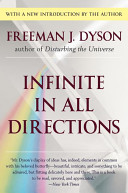Darwin and the Origins of Life
There is a curious parallelism between Darwin's twenty-year delay in publishing his theory of evolution and Newton's {102} twenty-year delay in publishing the Principia. And Newton's refusal to publish his cosmological speculations finds a parallel in Darwin's silence concerning the problem of the origin of life.
If we are to understand in general terms the place of life in the universe, we must also understand life's origin. Darwin explicitly excluded the origin of life from the scope of his theory of evolution. In his earliest outline of the theory, drawn up in 1839 or soon thereafter, he wrote, "Extent of my theory—having nothing to do with first origin of life, grow [sic], multiplication, mind (or with any attempt to find out whether descended from one form and what that form was)." He knew that only a massive and meticulous marshaling of evidence could make his theory convincing to his contemporaries; he had no hope of finding observational evidence relevant to the origin of life, and he therefore made no claim that the theory might throw light on the question of origins. Any such claim would expose a weak point in the structure of facts upon which his argument rested. He could, and did, discuss the origin of life privately among his friends. He could not discuss it publicly for fear of handing to his enemies the choice of a battleground which he could not defend with factual evidence. So, like Newton, Darwin kept his more radical thoughts private and presented to the world a scientific edifice of grand design but limited scope. "Hypotheses non fingo" became his motto, too. The effect of Darwin's caution was similar to the effect of Newton's. In both cases, a new science was created with clearly demarcated boundaries, and speculation transcending the boundaries was severely discouraged. The separation between biology and cosmology was reinforced by territorial boundaries on both sides. The question of the origin of life, which should have been a common meeting ground for the practitioners of both disciplines, became a no-man's-land accepted by neither.
We are fortunate to be living at a time when the barriers are breaking down. The collapse of the barriers was celebrated a few years ago at a meeting in Cambridge, where biologists {103} as respectable as Sydney Brenner mingled with cosmologists as respectable as Stephen Hawking. The title of the meeting was "Matter into Life," and the discussions were memorable not for the number of problems solved but for the number of problems unsolved. A huge territory now lies open, ranging from the crystallography of clay at one end to neurophysi-ology at the other, and over this whole area there is a continuity of unsolved problems ready to sprout into new sciences.
Notes:
Folksonomies: life theories barriers
Taxonomies:
/science/biology (0.436925)
/science (0.405482)
/society/senior living (0.314270)
Keywords:
life (0.923532 (positive:0.275072)), twenty-year delay (0.846386 (neutral:0.000000)), clearly demarcated boundaries (0.765936 (neutral:0.000000)), Hypotheses non fingo (0.731425 (neutral:0.000000)), origin (0.719518 (positive:0.232855)), Darwin (0.715098 (negative:-0.358618)), curious parallelism (0.591173 (neutral:0.000000)), cosmological speculations (0.589130 (neutral:0.000000)), meticulous marshaling (0.586357 (neutral:0.000000)), general terms (0.559832 (positive:0.317288)), theory (0.556370 (neutral:0.000000)), theory convincing (0.556061 (neutral:0.000000)), territorial boundaries (0.552208 (neutral:0.000000)), scientific edifice (0.551794 (positive:0.286646)), observational evidence (0.551438 (positive:0.232855)), weak point (0.549866 (negative:-0.225270)), earliest outline (0.547370 (neutral:0.000000)), factual evidence (0.542333 (negative:-0.690297)), grand design (0.538201 (positive:0.286646)), radical thoughts (0.537195 (positive:0.286646)), limited scope (0.536269 (neutral:0.000000)), Sydney Brenner (0.528154 (positive:0.325664)), Newton (0.528143 (negative:-0.645264)), unsolved problems (0.527392 (negative:-0.226027)), Stephen Hawking (0.525979 (positive:0.325664)), new science (0.524570 (neutral:0.000000)), huge territory (0.522597 (neutral:0.000000)), new sciences (0.519155 (negative:-0.226027)), common meeting (0.519077 (negative:-0.207795)), evolution (0.399119 (neutral:0.000000))
Entities:
Darwin:OperatingSystem (0.814780 (negative:-0.179309)), Newton:Person (0.716511 (negative:-0.645264)), theory of evolution:FieldTerminology (0.456133 (neutral:0.000000)), Principia:Organization (0.288526 (neutral:0.000000)), Sydney Brenner:Person (0.281845 (positive:0.325664)), Stephen Hawking:Person (0.280535 (positive:0.325664)), Cambridge:City (0.277211 (negative:-0.236383)), twenty-year:Quantity (0.277211 (neutral:0.000000))
Concepts:
Evolution (0.964571): dbpedia | freebase | opencyc
Life (0.899772): dbpedia | freebase
Francis Crick (0.770879): dbpedia | freebase | yago
Physics (0.750828): dbpedia | freebase | opencyc
Abiogenesis (0.732325): dbpedia | freebase
Biology (0.717713): dbpedia | freebase | opencyc
Universe (0.715660): dbpedia | freebase
Stephen Hawking (0.713074): dbpedia | freebase | opencyc | yago





